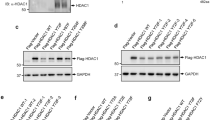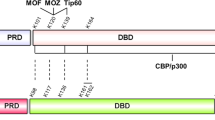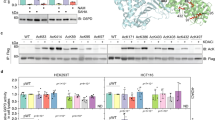Abstract
Sirtuins are class III deacetylases that regulate many essential processes, including cellular stress, genome stability and metabolism. Although these NAD+-dependent deacetylases control adaptive cellular responses, identification of sirtuin-regulated signaling targets remain under-studied. Here, we demonstrate that acetylation of the mitogen-activated protein kinase kinase-1 (MEK1) stimulates its kinase activity, and that acetylated MEK1 is under the regulatory control of the sirtuin family members SIRT1 and SIRT2. Treatment of cells with sirtuin inhibitors, or siRNA knockdown of SIRT1 or SIRT2 proteins, increases MEK1 acetylation and subsequent phosphorylation of the extracellular signal-regulated kinase. Generation of an acetyl-specific MEK1 antibody demonstrates that endogenous acetylated MEK1 is extensively enriched in the nucleus following epidermal growth factor stimulation. An acetyl-mimic of MEK1 increases inappropriate growth properties, suggesting that acetylation of MEK1 has oncogenic potential.
This is a preview of subscription content, access via your institution
Access options
Subscribe to this journal
Receive 50 print issues and online access
$259.00 per year
only $5.18 per issue
Buy this article
- Purchase on Springer Link
- Instant access to full article PDF
Prices may be subject to local taxes which are calculated during checkout




Similar content being viewed by others
References
Kyriakis JM, Avruch J . Mammalian MAPK signal transduction pathways activated by stress and inflammation: a 10-year update. Physiol Rev 2012; 92: 689–737.
Keshet Y, Seger R . The MAP kinase signaling cascades: a system of hundreds of components regulates a diverse array of physiological functions. Methods Mol Biol 2010; 661: 3–38.
Duffy A, Kummar S . Targeting mitogen-activated protein kinase kinase (MEK) in solid tumors. Target Oncol 2009; 4: 267–273.
Huang P, Han J, Hui L . MAPK signaling in inflammation-associated cancer development. Protein Cell 2010; 1: 218–226.
Roberts PJ, Der CJ . Targeting the Raf-MEK-ERK mitogen-activated protein kinase cascade for the treatment of cancer. Oncogene 2007; 26: 3291–3310.
Lawrence MC, McGlynn K, Shao C, Duan L, Naziruddin B, Levy MF et al. Chromatin-bound mitogen-activated protein kinases transmit dynamic signals in transcription complexes in β-cells. Proc Natl Acad Sci USA 2008; 105: 13315–13320.
Imai S, Armstrong CM, Kaeberlein M, Guarente L . Transcriptional silencing and longevity protein Sir2 is an NAD-dependent histone deacetylase. Nature 2000; 403: 795–800.
Landry J, Sutton A, Tafrov ST, Heller RC, Stebbins J, Pillus L et al. The silencing protein SIR2 and its homologs are NAD-dependent protein deacetylases. Proc Natl Acad Sci USA 2000; 97: 5807–5811.
Smith JS, Brachmann CB, Celic I, Kenna MA, Muhammad S, Starai VJ et al. A phylogenetically conserved NAD+-dependent protein deacetylase activity in the Sir2 protein family. Proc Natl Acad Sci USA 2000; 97: 6658–6663.
Haigis MC, Sinclair DA . Mammalian sirtuins: biological insights and disease relevance. Annu Rev Pathol 2010; 5: 253–295.
Verdin E, Hirschey MD, Finley LW, Haigis MC . Sirtuin regulation of mitochondria: energy production, apoptosis, and signaling. Trends Biochem Sci 2010; 35: 669–675.
Brooks CL, Gu W . How does SIRT1 affect metabolism, senescence and cancer? Nat Rev Cancer 2009; 9: 123–128.
Deng CX . SIRT1, is it a tumor promoter or tumor suppressor? Int J Biol Sci 2009; 5: 147–152.
Saunders LR, Verdin E . Sirtuins: critical regulators at the crossroads between cancer and aging. Oncogene 2007; 26: 5489–5504.
Kim HS, Vassilopoulos A, Wang RH, Lahusen T, Xiao Z, Xu X et al. SIRT2 maintains genome integrity and suppresses tumorigenesis through regulating APC/C activity. Cancer Cell 2011; 20: 487–499.
Wang RH, Sengupta K, Li C, Kim HS, Cao L, Xiao C et al. Impaired DNA damage response, genome instability, and tumorigenesis in SIRT1 mutant mice. Cancer Cell 2008; 14: 312–323.
Li M, Luo R, Chen J, Cao Y, Lu J, He J et al. High expression of transcriptional coactivator p300 correlates with aggressive features and poor prognosis of hepatocellularcarcinoma. J Transl Med 2011; 9: 5.
Xiao X, Cai M, Chen J, Guan X, Kung H, Zeng Y et al. High expression of p300 in human breast cancer correlates with tumor recurrence and predicts adverse prognosis. Chin J Cancer Res 2011; 23: 201–207.
Blalock WL, Pearce M, Steelman LS, Franklin RA, McCarthy SA, Cherwinski H et al. A conditionally-active form of MEK1 results in autocrine tranformation of human and mouse hematopoietic cells. Oncogene 2000; 19: 526–536.
Giroux S, Tremblay M, Bernard D, Cardin-Girard JF, Aubry S, Larouche L et al. Embryonic death of Mek1-deficient mice reveals a role for this kinase in angiogenesis in the labyrinthine region of the placenta. Curr Biol 1999; 9: 369–372.
Catalanotti F, Reyes G, Jesenberger V, Galabova-Kovacs G, de Matos Simoes R, Carugo O et al. A Mek1-Mek2 heterodimer determines the strength and duration of the Erk signal. Nat Struct Mol Biol 2009; 16: 294–303.
Park ER, Eblen ST, Catling AD . MEK1 activation by PAK: a novel mechanism. Cell Signal 2007; 19: 1488–1496.
Resing KA, Mansour SJ, Hermann AS, Johnson RS, Candia JM, Fukasawa K et al. Determination of v-Mos-catalyzed phosphorylation sites and autophosphorylation sites on MAP kinase kinase by ESI/MS. Biochemistry 1995; 34: 2610–2620.
Yeung F, Hoberg JE, Ramsey CS, Keller MD, Jones DR, Frye RA et al. Modulation of NF-kappaB-dependent transcription and cell survival by the SIRT1 deacetylase. EMBO J 2004; 23: 2369–2380.
Allison DF, Wamsley JJ, Kumar M, Li D, Gray LG, Hart GW et al. Modification of RelA by O-linked N-acetylglucosamine links glucose metabolism to NF-kappaB acetylation and transcription. Proc Natl Acad Sci USA 2012; 109: 16888–16893.
Bajpe PK, Prahallad A, Horlings H, Nagtegaal I, Beijersbergen R, Bernards R . A chromatin modifier genetic screen identifies SIRT2 as a modulator of response to targeted therapies through the regulation of MEK kinase activity. Oncogene (e-pub ahead of print 27 January 2014; doi: 10.1038/onc.2013.588).
Acknowledgements
We thank Drs JS Smith, PT Stukenberg, JJ Wamsley and Ms A Sherman for scientific and editorial review. HA-MEK1, HA-MEK1(S218/222D) and Flag-ERK1 were gifts from Dr M Weber, University of Virginia. p300 was provided by Dr D Livingston, Dana-Farber Cancer Institute. Gal4-ELK1 was a gift from Dr C Der, University of North Carolina. V5-SIRT1 and Flag-SIRT2 were gifts from E Verdin, Gladstone Institute. The pBabe-puro vector was provided by Dr Robert Weinberg, Whitehead Institute, MIT. Work was supported by the National Cancer Institute (CA132580 and CA104397) to MWM, and CA110552 awarded to FY.
Author information
Authors and Affiliations
Corresponding author
Ethics declarations
Competing interests
The authors declare no conflict interest.
Additional information
Supplementary Information accompanies this paper on the Oncogene website
Supplementary information
Rights and permissions
About this article
Cite this article
Yeung, F., Ramsey, C., Popko-Scibor, A. et al. Regulation of the mitogen-activated protein kinase kinase (MEK)-1 by NAD+-dependent deacetylases. Oncogene 34, 798–804 (2015). https://doi.org/10.1038/onc.2014.39
Received:
Revised:
Accepted:
Published:
Issue Date:
DOI: https://doi.org/10.1038/onc.2014.39
This article is cited by
-
O-GlcNAcylation regulates breast cancer metastasis via SIRT1 modulation of FOXM1 pathway
Oncogene (2017)
-
A Novel Technique for Accelerated Culture of Murine Mesenchymal Stem Cells that Allows for Sustained Multipotency
Scientific Reports (2017)
-
Critical role of acetylation in tau-mediated neurodegeneration and cognitive deficits
Nature Medicine (2015)



